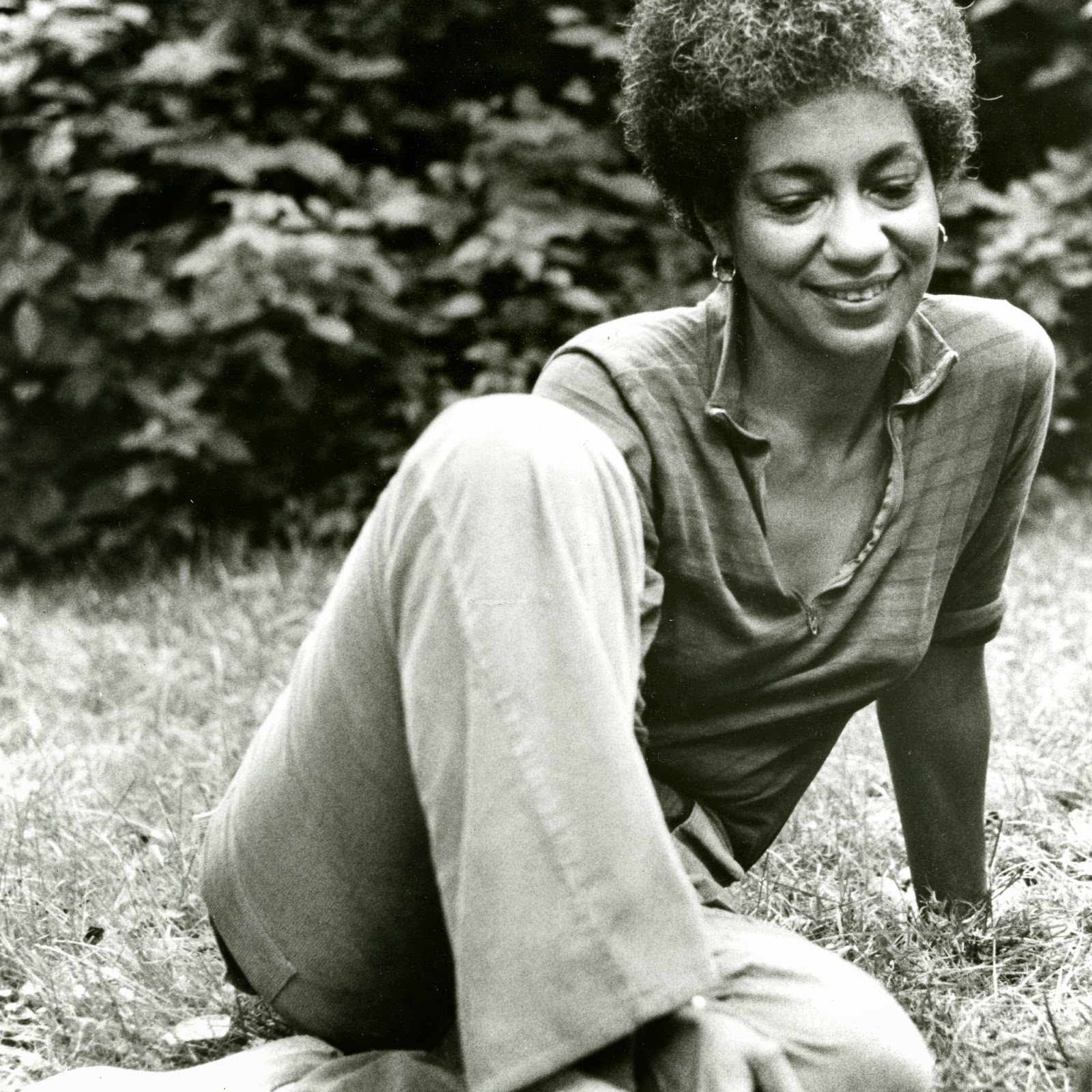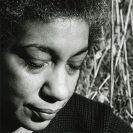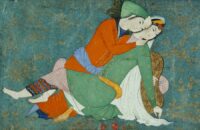
Invocación a las minorías silenciosas
HEY
VENGAN
SALGAN
DONDE QUIERA QUE ESTÉN
NECESITAMOS REUNIRNOS
EN ESTE ÁRBOL
QUE NO HA SIDO
PLANTADO
TODAVÍA
June Jordan, en Palabra terrestre (poesía negra), Antología de Editorial Leviatán, Buenos Aires, 1998 (versión de Diana Bellessi)
Y el poema que sigue es una muestra de su fino sentido para conjugar poesía y política.
Poema sobre mis derechos
Incluso esta noche necesito caminar y despejar
mi cabeza en relación a este poema sobre por qué no puedo
salir sin cambiarme de ropa de zapatos
ni la posición de mi cuerpo o la identidad de mi género mi edad
mi status de mujer sola al atardecer/
sola en las calles/ sola no siendo el caso/
el caso es que no puedo hacer lo que quiero
con mi propio cuerpo porque soy del sexo
equivocado de la edad equivocada del color de piel equivocado y
supón que no es aquí en la ciudad sino allá en la playa/
o en la profundidad del bosque y quisiese ir
sola mi alma ahí a divagar sobre Dios/ o
los niños o a pensar sobre el mundo/ todo eso
revelado por las estrellas y el silencio:
no podía ir y no podía pensar y no podía
quedarme ahí
sola
como lo necesito
sólo porque no puedo hacer lo que quiero con mi propio
cuerpo y
quién mierda hizo las cosas así
de este modo
y en Francia dicen que si el tipo penetra
pero no eyacula entonces no me violó
y si después de acuchillarlo si después de los gritos si
después de rogarle al bastardo y si incluso después de darle
con un martillo sobre la cabeza si incluso después de eso él
y sus amigotes me fornican después de eso
entonces yo lo permití y no hubo
ninguna violación porque finalmente entiendes finalmente
me fornicaron porque yo estaba equivocada yo estaba
equivocada nuevamente por ser yo siendo yo donde estaba /equivocada
de ser quién soy
lo que es exactamente como Sudáfrica
penetrando en Namibia penetrando en
Angola y acaso eso significa quiero decir cómo sabes si
Pretoria eyacula cómo es que se reconocerá la evidencia la
prueba de la eyaculación del monster jackboot en Blackland
y si
después de Namibia y si después de Angola y si después de Zimbawe
y si después de que todos mis parientes y mujeres resistan incluso a
la auto-inmolación de las villas y si después de eso
igual perdemos qué van a decir los muchachotes reclamarán
mi aprobación:
Me Logras Seguir: Somos el pueblo equivocado de
la piel equivocada en el continente equivocado y sobre qué
diablos están todos siendo tan razonables
y de acuerdo al Times esta semana
allá por 1966 la C.I.A. decidió que tenían este problema
y el problema era un hombre llamado Nkrumah así es que
lo mataron y antes de eso fue Patrice Lumumba
y antes de eso fue mi padre en los terrenos
de mi escuela de Ivy League y mi padre con miedo
de caminar en dirección a la cafetería porque dijo que
era una equivocación de edad equivocada de piel equivocada de identidad
de género equivocada y estaba pagando mi escolaridad y
antes de eso
era mi padre diciendo que yo estaba equivocada diciendo que
debería haber sido niño porque él quería uno/ un
niño y que debiera haber tenido la piel más clara y
que debiera haber tenido el pelo más liso y que
no debería ser tan amante de los chicos que en cambio yo debería
haber sido uno/un chico y antes de eso
era mi madre implorando por una cirugía plástica para mí
mi nariz y para mis dientes frenillos y diciéndome
que suelte los libros en otras palabras
que pierdan
estoy muy interiorizada de los problemas de la C.I.A.
y los problemas de Sudáfrica y los problemas
de la Corporación Exxon y en general de los problemas
de la América blanca y los problemas de los profesores
y los predicadores y los del F.B.I. y los trabajadores
sociales y mi madre y padre personalmente/estoy muy
interiorizada de los problemas porque los problemas
resultan ser
yo
yo soy la historia de la violación
yo soy la historia del rechazo a quien soy
yo soy la historia de la terrorífica encarcelación de
mí misma
yo soy la historia de los asaltos y la agresión y de ilimitados
ejércitos en contra de todo lo que quiera hacer con mi cabeza
y mi cuerpo y mi alma y
sin importar si se trata de caminar en la noche
o si se trata del amor que siento o
si se trata de la santidad de mi vagina o
de la santidad de mis fronteras nacionales
o la santidad de mis líderes o la santidad
de todos y cada uno de mis deseos
que sé yo de mi personal e idiosincrásico
e indiscutiblemente solo y singular corazón
que he sido violada
porque estoy equivocada, soy del sexo equivocado la edad
equivocada la piel equivocada la nariz equivocada el pelo equivocado la
necesidad equivocada el sueño equivocado la geografía equivocada
el sastre equivocado yo
he sido el significado de la violación
he sido el problema que todos buscan
eliminar a través de la penetración
forzada con o sin la evidencia de mugre y/
pero no confundamos este poema
no es que consienta yo no me entrego así como así
a mi madre a mi padre a mis maestros al
F.B.I. a Sudáfrica a Bedford-Stuy
a Park Avenue a American Airlines a los ociosos
de pene erecto en las esquinas a los rastreros
en autos
no estoy equivocada: Equivocada no es mi nombre
Mi nombre es mío mío mío
y no puedo decirte quién crestas hizo las cosas así
pero sí puedo decirte que de ahora en adelante mi resistencia
mi auto-determinación simple y cotidiana y nocturna
puede muy bien costarte la vida.
Poem about my rights
Even tonight and I need to take a walk and clear
my head about this poem about why I can’t
go out without changing my clothes my shoes
my body posture my gender identity my age
my status as a woman alone in the evening/
alone on the streets/alone not being the point/
the point being that I can’t do what I want
to do with my own body because I am the wrong
sex the wrong age the wrong skin and
suppose it was not here in the city but down on the beach/
or far into the woods and I wanted to go
there by myself thinking about God/or thinking
about children or thinking about the world/all of it
disclosed by the stars and the silence:
I could not go and I could not think and I could not
stay there
alone
as I need to be
alone because I can’t do what I want to do with my own
body and
who in the hell set things up
like this
and in France they say if the guy penetrates
but does not ejaculate then he did not rape me
and if after stabbing him if after screams if
after begging the bastard and if even after smashing
a hammer to his head if even after that if he
and his buddies fuck me after that
then I consented and there was
no rape because finally you understand finally
they fucked me over because I was
wrong I was wrong again to be me being me where I was/wrong
to be who I am
which is exactly like South Africa
penetrating into Namibia penetrating into
Angola and does that mean I mean how do you know if
Pretoria ejaculates what will the evidence look like the
proof of the monster jackboot ejaculation on Blackland
and if
after Namibia and if after Angola and if after Zimbabwe
and if after all of my kinsmen and women resist even to
self-immolation of the villages and if after that
we lose nevertheless what will the big boys say will they
claim my consent:
Do You Follow Me: We are the wrong people of
the wrong skin on the wrong continent and what
in the hell is everybody being reasonable about
and according to the Times this week
back in 1966 the C.I.A. decided that they had this problem
and the problem was a man named Nkrumah so they
killed him and before that it was Patrice Lumumba
and before that it was my father on the campus
of my Ivy League school and my father afraid
to walk into the cafeteria because he said he
was wrong the wrong age the wrong skin the wrong
gender identity and he was paying my tuition and
before that
it was my father saying I was wrong saying that
I should have been a boy because he wanted one/a
boy and that I should have been lighter skinned and
that I should have had straighter hair and that
I should not be so boy crazy but instead I should
just be one/a boy and before that
it was my mother pleading plastic surgery for
my nose and braces for my teeth and telling me
to let the books loose to let them loose in other
words
I am very familiar with the problems of the C.I.A.
and the problems of South Africa and the problems
of Exxon Corporation and the problems of white
America in general and the problems of the teachers
and the preachers and the F.B.I. and the social
workers and my particular Mom and Dad/I am very
familiar with the problems because the problems
turn out to be
me
I am the history of rape
I am the history of the rejection of who I am
I am the history of the terrorized incarceration of
myself
I am the history of battery assault and limitless
armies against whatever I want to do with my mind
and my body and my soul and
whether it’s about walking out at night
or whether it’s about the love that I feel or
whether it’s about the sanctity of my vagina or
the sanctity of my national boundaries
or the sanctity of my leaders or the sanctity
of each and every desire
that I know from my personal and idiosyncratic
and indisputably single and singular heart
I have been raped
because I have been wrong the wrong sex the wrong age
the wrong skin the wrong nose the wrong hair the
wrong need the wrong dream the wrong geographic
the wrong sartorial I
I have been the meaning of rape
I have been the problem everyone seeks to
eliminate by forced
penetration with or without the evidence of slime and/
but let this be unmistakable this poem
is not consent I do not consent
to my mother to my father to the teachers to
the F.B.I. to South Africa to Bedford-Stuy
to Park Avenue to American Airlines to the hardon
idlers on the corners to the sneaky creeps in
cars
I am not wrong: Wrong is not my name
My name is my own my own my own
and I can’t tell you who the hell set things up like this
but I can tell you that from now on my resistance
my simple and daily and nightly self-determination
may very well cost you your life.
Sobre la autora:
 June Jordan nació en Harlem, New York City, en 1936, y murió en junio de 2002, en Berkeley. Fue una prolífica poeta, activista y ensayista. Sus libros más famosos son: Civil Wars (1981), On Call (1985) y Technical Difficulties (1992). También fue columnista regular de The Progressive, The Village Voice, The New York Times, The American Poetry Review, The Nation, entre otros periódicos revistas. Ha publicado gran cantidad de poemarios, transformándose, para la crítica norteamericana, en una poeta con alto sentido político del arte y en una voz universal de la poesía.
June Jordan nació en Harlem, New York City, en 1936, y murió en junio de 2002, en Berkeley. Fue una prolífica poeta, activista y ensayista. Sus libros más famosos son: Civil Wars (1981), On Call (1985) y Technical Difficulties (1992). También fue columnista regular de The Progressive, The Village Voice, The New York Times, The American Poetry Review, The Nation, entre otros periódicos revistas. Ha publicado gran cantidad de poemarios, transformándose, para la crítica norteamericana, en una poeta con alto sentido político del arte y en una voz universal de la poesía.





Be First to Comment